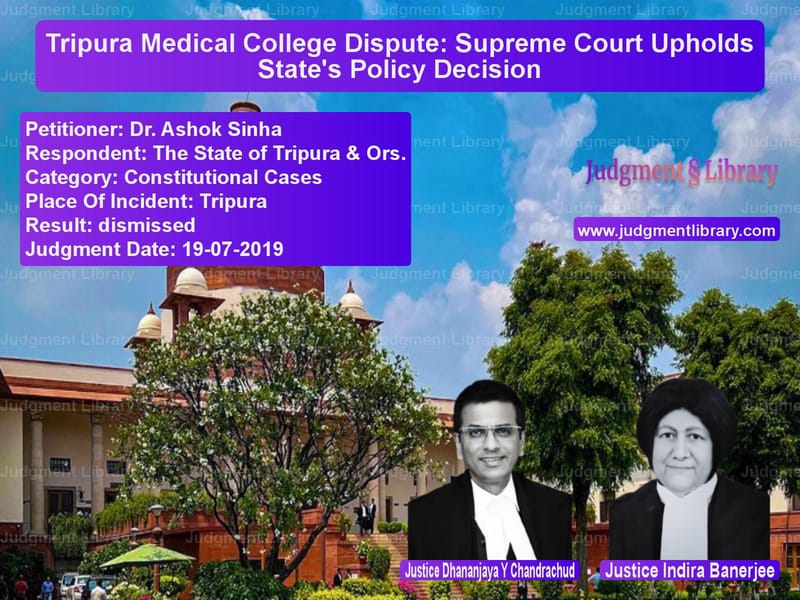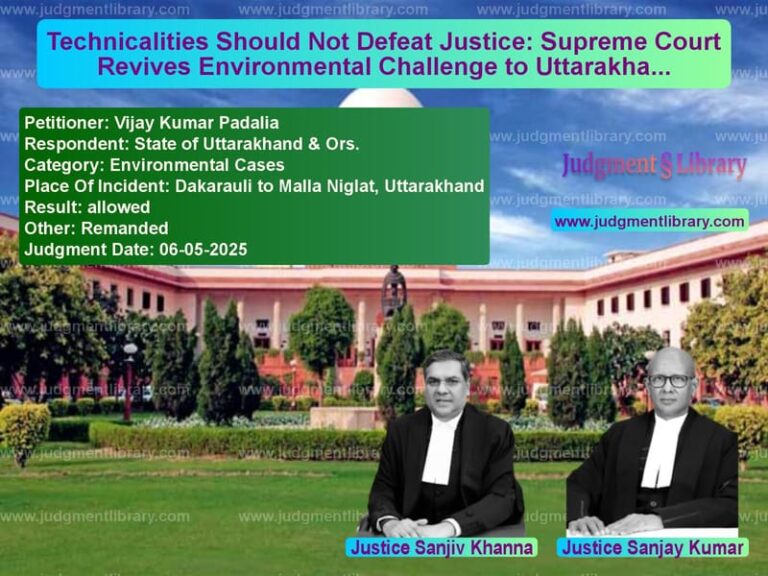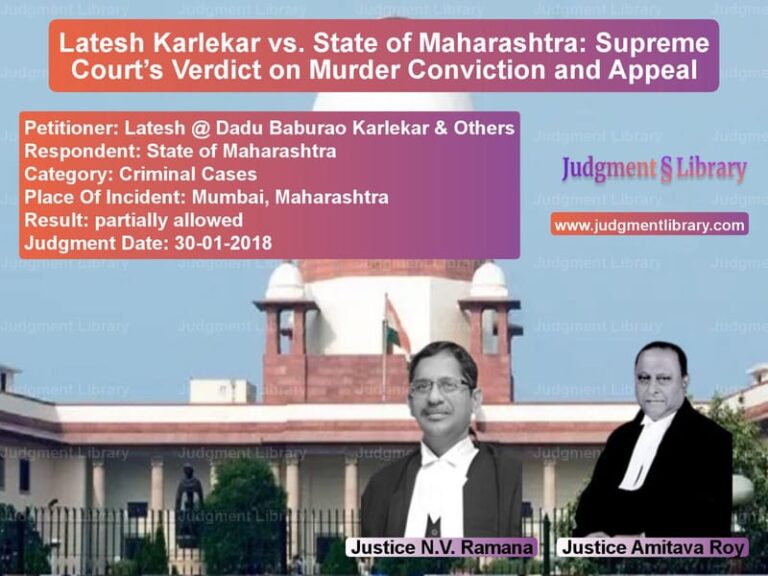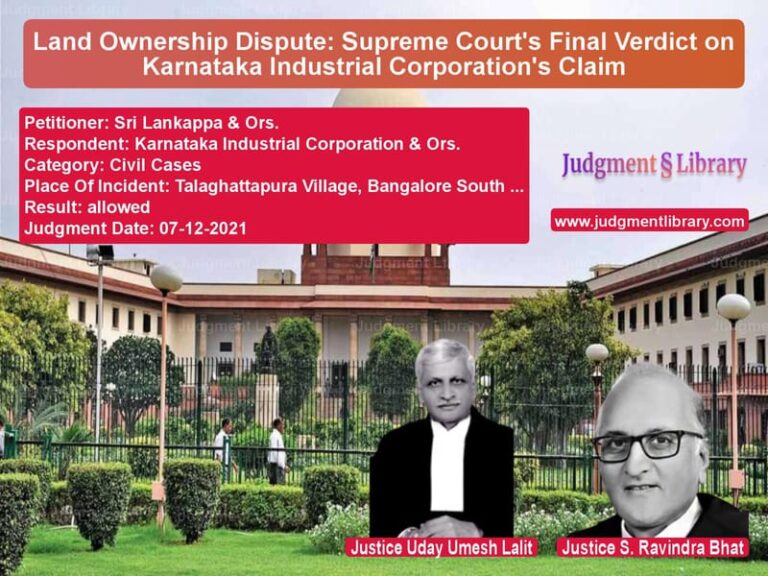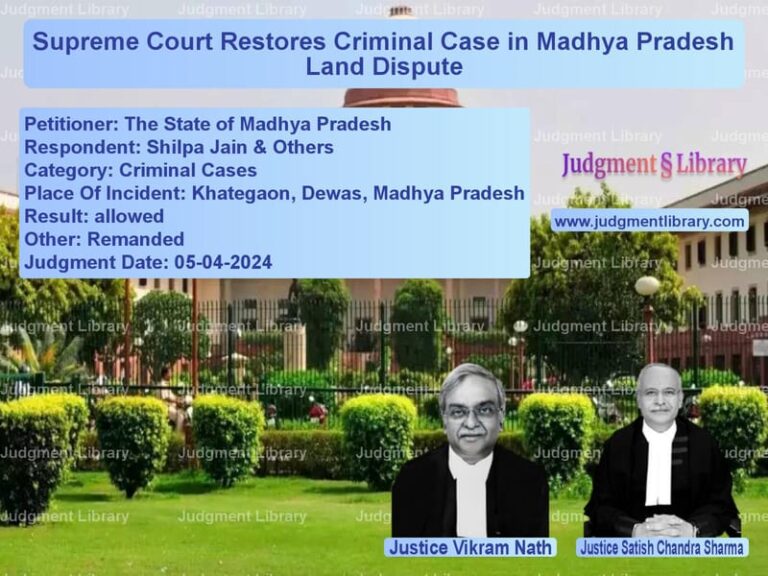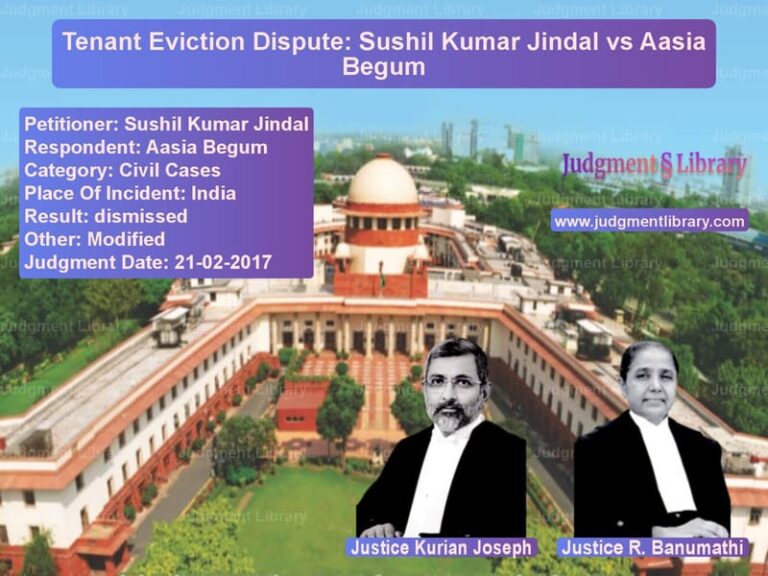Tripura Medical College Dispute: Supreme Court Upholds State’s Policy Decision
The case of Dr. Ashok Sinha v. The State of Tripura & Ors. revolves around the governance of Tripura Medical College and whether it should be run as a state government institution or through an independent society. The Supreme Court upheld the Tripura government’s decision to manage the medical college through a hybrid model, ruling that policy decisions regarding the administration of educational institutions fall within the executive’s domain.
Background of the Case
The case originated from a public interest litigation (PIL) filed by Dr. Ashok Sinha, questioning the administrative control and fee structure of Tripura Medical College. The issue was first raised in 2015, and the High Court of Tripura directed the state government to take a clear stance on whether it would reconstitute the management committee or retain direct administrative control.
Key Events
- On April 30, 2015, the Tripura High Court directed the state government to decide the administrative control of Tripura Medical College.
- The state government reconstituted the governing body, establishing an independent society to oversee the medical college.
- In 2016, Dr. Ashok Sinha filed a fresh PIL alleging that the reconstitution had not changed the ground reality.
- He challenged the admission process and fee structure, arguing that the college should charge fees at par with other government medical colleges in the Northeast.
- On June 24, 2016, the High Court dismissed the PIL, leading to an appeal before the Supreme Court.
Arguments of the Parties
Petitioner’s (Dr. Ashok Sinha’s) Argument
- The Tripura Medical College was initially run by an NGO but later taken over by the state government.
- The reconstitution of the management committee did not ensure full government control, leading to arbitrary fee structures.
- The institution should function as a government medical college to ensure transparency and affordability.
- Fee structures should be at par with other Northeast government medical colleges.
Respondent’s (State of Tripura’s) Argument
- The reconstituted Tripura Medical College Society has independent administration.
- While government officials are part of the society, its day-to-day operations are managed by non-governmental members.
- The college runs on a self-sustaining model, relying on tuition fees rather than state funds.
- Government funding was provided as an interest-free loan to be repaid over 15 years.
- It is a matter of state policy whether the institution should be fully government-run or managed through a society.
Supreme Court’s Analysis
On the State Government’s Decision
The Supreme Court noted that the High Court had not directed the government to run Tripura Medical College as a government institution but had asked it to take a clear decision:
“The High Court did not issue a mandamus directing the State to take over the medical college. Such a direction was correctly not issued, as it pertains to the realm of policy.”
On Judicial Review of Policy Decisions
The Court ruled that it was beyond the scope of judicial review to mandate how a medical college should be run:
“It would not be appropriate for the High Court, in the exercise of jurisdiction under Article 226, to direct the State to either take over the college as a government institution or hand it over to the private sector.”
The judgment emphasized that state policy decisions should be respected unless they violate constitutional rights or statutory provisions.
On Fee Structure and Accessibility
The Court acknowledged concerns regarding the fee structure but clarified that any grievances must be addressed through the regulatory committee established for fee regulation in medical colleges:
“If any student has a grievance regarding fees, they may approach the regulatory committee constituted in the State.”
Final Judgment
The Supreme Court dismissed the appeal, upholding the state government’s authority to run the college through an independent society.
“Having considered the High Court’s judgment and the grievances raised, we find no merit in the appeal.”
No costs were awarded.
Significance of the Judgment
- Defines Policy Discretion: Reinforces that courts should not interfere in policy matters unless fundamental rights are at stake.
- Clarifies Role of Government Oversight: Confirms that government oversight does not automatically convert a college into a state-run institution.
- Encourages Self-Sustaining Models: Affirms the validity of educational institutions operating independently while receiving state guidance.
- Limits Judicial Overreach: Prevents courts from mandating specific administrative structures in public institutions.
Conclusion
The Supreme Court’s ruling in Dr. Ashok Sinha v. The State of Tripura reinforces that decisions regarding medical college administration fall within state policy discretion. The judgment ensures that educational institutions can function autonomously while remaining accountable through regulatory mechanisms. This ruling is a crucial precedent for the governance of public-private hybrid institutions in India.
Petitioner Name: Dr. Ashok Sinha.Respondent Name: The State of Tripura & Ors..Judgment By: Justice Dhananjaya Y Chandrachud, Justice Indira Banerjee.Place Of Incident: Tripura.Judgment Date: 19-07-2019.
Don’t miss out on the full details! Download the complete judgment in PDF format below and gain valuable insights instantly!
Download Judgment: Dr. Ashok Sinha vs The State of Tripura Supreme Court of India Judgment Dated 19-07-2019.pdf
Direct Downlaod Judgment: Direct downlaod this Judgment
See all petitions in Public Interest Litigation
See all petitions in Education Related Cases
See all petitions in Judgment by Dhananjaya Y Chandrachud
See all petitions in Judgment by Indira Banerjee
See all petitions in dismissed
See all petitions in supreme court of India judgments July 2019
See all petitions in 2019 judgments
See all posts in Constitutional Cases Category
See all allowed petitions in Constitutional Cases Category
See all Dismissed petitions in Constitutional Cases Category
See all partially allowed petitions in Constitutional Cases Category

